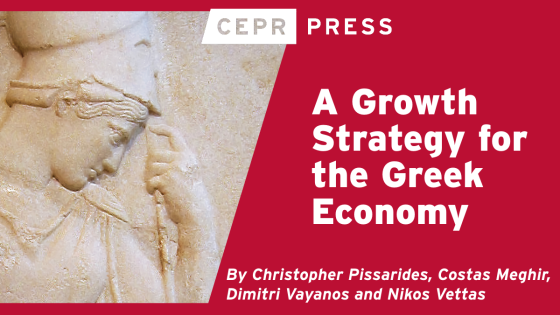In the movie Groundhog Day, a weatherman finds himself living the same day over and over again. Eurozone policymakers might be forgiven if they also feel like they are stuck in a time loop, forced into a déjà-vu experience with a possible Grexit scenario. After a quiet 2014, the Eurozone is back in crisis mode, though not in a panic.
- The new Greek government is insisting on an international debt conference and a significant cut in its sovereign debt.
Most of the other Eurozone governments and the ECB, together now holders of 80% of this debt and whose taxpayers would thus have to pay for such debt restructuring, won’t have any of it.
- Few weeks remain until the Greek government might run out of cash to pay all its obligations, and Greek banks are losing access to ECB liquidity.
The Eurozone seems again to be heading straight towards the cliff.
While many observers considered the worst of the crisis over and the risk of a break-up of the Eurozone gone in late 2013/early 2014, this re-emergence of the crisis is not surprising. Different strands of economics provide different answers to why the Greek crisis has not only re-emerged, but might stay with us for quite some time, as I will discuss in the following. I will argue that, ultimately, at the core of the crisis is a governance deficiency within the Eurozone. And as long as this is not addressed, there are many more Groundhog Days to come!
Debt sustainability (or the lack thereof)
With a debt-to-GDP ratio of 175%, Greek debt is clearly not sustainable. The debt restructuring of 2012 was supposed to bring this ratio eventually back to 110%, a level considered sustainable by the IMF, and thus take Greece back onto the long-term path of fiscal sustainability. However, fiscal deficits and GDP growth alike have been underestimated, with the result being an unsustainable debt path.
Even if one does not believe in a specific threshold beyond which a debt-to-GDP ratio undermines economic growth, it is not difficult to see that on macroeconomic grounds, further debt restructuring for Greece is needed. The solution envisioned by many Eurozone finance ministers (mainly for political reasons, as I will argue below) to reduce interest rate payments further and lengthen the maturity of loans simply delays the day of reckoning.
- The banking crisis literature has taught us that flow solutions (where banks grow themselves out of insolvency with higher margins) do not work.
- It is hard to believe that a flow solution would work for governments.
Eichengreen and Panizza (2014) have recently made the same point. It is highly unlikely that Greece will be able to accumulate the necessary primary surpluses to grow out of its debt problem.
However, there are also microeconomic arguments for structural impediments that prevent the Greek economy from returning on a long-term growth path. While there have been improvements in tax collection, it is quite telling that tax revenues have dropped in the run-up to elections as many taxpayers hope for tax amnesties or special favours from the winner after the election. Corruption, if not outright theft, in government still seems too widespread. Labour and product market rigidities prevent new firm and employment creation and more efficient and growth-enhancing resource allocation.
There is a certain tension between the macro- and the micro-side of this story. Structural reform rarely brings immediate growth benefits and might create additional frictions and losses. Privatisation during a time of depressed prices is rarely beneficial; fire-sales can further reduce the price, especially in times of general economic uncertainty. On the other hand, purely macroeconomic solutions that leave existing socioeconomic structures and institutions in place are bound to result in déjà-vu experiences. One of the most quoted newspaper headlines in the Argentine crisis of 2001 was that from a similar crisis 100 years earlier (1890 to be exact), which showed very similar characteristics.
The political economy of the Greek crisis
The macro- and micro-dimensions of the Greek crisis come together in its political economy. Critics of a generous debt restructuring – one that would allow a blank slate for the Greek budget – point to the moral hazard risk of such a move with respect to Greece and other EZ nations with high debt-to-GDP ratios. Only a reforms-for-debt-relief deal will lead Greece back to sustainability without permanent budget support from the Eurozone, according to the critics.
So much for the theory. Experience with reforms-for-debt-relief deals over the past three years has been rather disappointing. Critics of the outgoing Greek government point to the deep links between the Greek political elite (PASOK and ND) and the economic elite, who benefitted enormously from corrupt and inefficient government structures. The costs of the crisis, on the other hand, have been imposed on the weakest parts of society, with a lost generation of unemployed youth, high migration and increasing social and economic exclusion. While the macroeconomic adjustment has been ‘successful’ in improving the fiscal and current account position of Greece, microeconomic reforms have been slow.
- As in any crisis, there are enormous distributional repercussions and these fed back into the political process, resulting in the new left-wing government.
There are also distributional complications on the Eurozone level.
Crises are best solved by recognising losses, allocating them and moving on
Only a small part of the Greek crisis losses has been recognised.
- Banks have been able to shift their share of the losses over to governments, in the “greatest carry-trade” ever (Acharya and Steffen 2013).
- The Eurozone approach has been one of extending loans, pretending that they will be repaid.
There was broad support for this approach three years ago amid fears that a Greek departure from the euro would result in a breakdown of the monetary union. Similar pressure might be less this time around.
It is deep-seated – the institutional approach
The previous government might have been too timid to rigorously undertake structural reforms, given the entrenched interests. The new government, which is not beholden to the old elites, might be more courageous in addressing tax evasion and corrupt structures. Institutional economists are more pessimistic – once rent-seeking structures are established, they are used by whoever has power.
Reforms of formal (de jure) institutions pushed on the country by outside institutions, such as the Troika, are rarely successful if they do not change the underlying socioeconomic power structure and de facto institutions (Acemoglu and Robinson 2008).
And while the institutional literature also points to the possibility that large outside shocks can change the balance of socioeconomic power and thus trigger profound changes in the institutional framework of a country, such shocks are difficult to imagine under a democratic regime (Acemoglu et al. 2009). The institutional literature thus predicts many more Groundhog Days for Greek and EZ policymakers, with or without sufficient debt restructuring.
Then there is the political conversation on the Greek debt crisis, partly fuelled by the economic and political economy arguments outlined above. This conversation sees a dichotomy between creditor and debtor states in the Eurozone.
- On the one hand, creditors point to the substantial debt restructuring from 2011, quietly ignoring that most of that bailout benefitted financial institutions in the creditor countries, which otherwise would have been in need of government support.
- On the other hand, the new Greek government points correctly to enormous social costs of the Troika programme, quietly ignoring the fact that many of the necessary reforms that could attract more private investment, higher tax revenues and ultimately higher growth have been promised but not implemented.
All politics is local, also in the Eurozone
The current political conversation focuses on the negotiation process between Greece and the Eurozone. On the one hand, the new Greek government has raised high expectations among its electorate that it will ‘send the Troika packing’. Any compromise without substantial gains will therefore put the new government parties, Syriza and Anel, into a difficult if not politically unsustainable position. On the other hand, governments in the major creditor countries face substantial political constraints, ranging from the upcoming Finnish elections in April, to the populist right-wing movement of Geert Wilders in the Netherlands, to the rising poll results for the new anti-euro party to the right of Angela Merkel’s CDU/CSU, not to mention governments in other periphery countries that face strong competition from similar political movements to Syriza. Further concessions to the new Greek government, or even a debt cut, will put governments across the Eurozone under enormous political pressure.
As I argued above, losses have to be allocated in a crisis; the challenges in the Eurozone are that there is a geographic dimension to it in the form of creditor and debtor countries, and that these losses have not been clearly recognised yet.
For several years, EZ governments insisted in quick order:
- That Greece did not have any problems;
- That Greece had problems but they were only liquidity problems;
- That Greece needed only transitional support; and
- That any loans to Greece would eventually be paid back.
While interest rates subsidies and grace periods for government loans to Greece clearly constitute redistribution from the rest of the Eurozone to Greece, this is politically still more palatable than a clear recognition of losses in the form of a debt cut.
Allocation of losses requires their recognition
Losses in Europe cannot be allocated before they are not clearly recognised. This is the Eurozone’s first mistake and where the biggest political deficiency lies: the lack of an open and transparent conversation with electorates across Europe on the incurred losses and the need to absorb them. The second mistake – linked to the governance issue discussed below – is the ‘every nation for itself’ approach that has emerged. EZ leaders are not clearly explaining the interdependence of EZ national economies in the Eurozone. What is good for Greece (and other struggling members) can also be good for the rest of the Eurozone.
The Eurozone crisis is ultimately a governance crisis
Crisis resolution in the Eurozone over the past six years has been unsystematic, to say the least.
- None of the ad hoc, early Monday morning compromises among national governments was optimal for the Eurozone, though they might have maximised the sum of national interests.
- Many of these compromises were half-baked and ultimately kicked the can down the road.
There has been little progress in complementing the currency union with banking, fiscal and political unions to make it sustainable, although the need for this is widely recognised.
This lack of an institutional framework and appropriate policy coordination has put a greater and greater burden on the ECB, which is the only truly EZ-level institution, but one that is not democratically legitimised. The ECB has slowly expanded its brief, only partly with formal mandates such as in the case of the Single Supervisory Mechanism. Large parts of the German political and economic elite are already up in arms about the ECB expanding into fiscal space in what they see as illegal financing of government expenditures in periphery countries and taking away market discipline.
Not only has rhe ECB been able to keep the currency union together, with ‘whatever it takes’, but it has also tried to lift the Eurozone’s economies where national government have failed, most prominently with the move towards QE.
- Where politics has kicked the can down the road, the ECB has been able to at least keep the can on the road.
The question in the current crisis is whether the ECB will continue to be able to do so. If Greece leaves the current Troika programme with no additional agreement, the ECB might not be able to support the Greek banking system any further due to legal constraints. Looking for legal loopholes to continue doing so might turn into a political nightmare for the ECB and an open clash among board members.
It can be argued that the institutional progress – e.g. in the form of the banking union and fiscal compact – has been significant and that further institutional reforms will take strong political will and longer time. The question is whether the continuous crisis will provide enough incentive for the necessary further deepening of institutional structures within the Eurozone before it is too late.
Where to go from here
The most likely outcome is the familiar one – another compromise of extending and pretending that kicks the can further down the road.
- This compromise will likely involve further lengthening of repayment periods for Greek government debt and fresh loans by the EU and IMF.
- There is, however, a high risk that the unexperienced Greek government will either trigger a Grexit or will fall if parliamentary support breaks down.
There is only a small chance that there will be a grand bargain, with sufficient additional debt restructuring and a serious attempt by the Greek government to address structural and institutional deficiencies at home.
The biggest risk does not seem to be the lack of a compromise solution, it instead seems to be that such a compromise will not address the underlying problems and will kick the can yet further down the road, with political animosities and fringe parties rising further across the Eurozone, including in Greece.
- The ugly head of nationalism is slowly raising its head across Europe; as the can rolls down the road, the scenery becomes politically and socially less and less attractive.
It is stagnation… and it is secular!
Greece might be a special case among the EZ crisis countries, given its macroeconomic and deep structural and institutional weaknesses. However, the time loop in which policymakers in the Eurozone find themselves illustrates a larger problem. There is evidence that the Eurozone is in secular stagnation (Summers 2014), partly due to the asymmetric policy recipe applied within the Eurozone, with the burden falling completely on the debtor countries, ultimately resulting in deflation and zero growth across the Eurozone (De Grauwe 2015). However, the causes for this secular stagnation go beyond economic policy and the consequences beyond economic performance. The core problem is the deficient governance structure for the Eurozone and the consequences are societies being stuck in a time loop of increasing socioeconomic exclusion and political despair.
References
Acemoglu, D, D Cantoni, S Johnson and J A Robinson (2009), “The consequences of external reform: Lessons from the French Revolution”, VoxEU.org, 2 July.
Acemoglu, D and J A Robinson (2008), “Persistence of Elites, Power and Institutions”, American Economic Review 98, pp. 267-293
Acharya, V and S Steffen (2013), “The ‘Greatest’ Carry Trade Ever? Understanding Eurozone Bank Risks”, CEPR Discussion Paper No. 9432.
De Grauwe, P (2015), “Secular stagnation in the Eurozone”, VoxEU.org, 30 January.
Eichengreen, B and U Panizza (2014), “A Surplus of Ambition: Can Europe Rely on Large Primary Surpluses to Solve its Debt Problem?”, VoxEU.org, 30 October.


